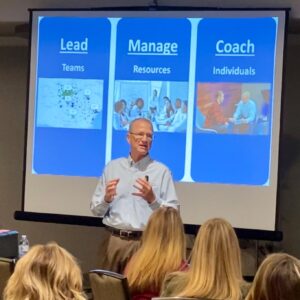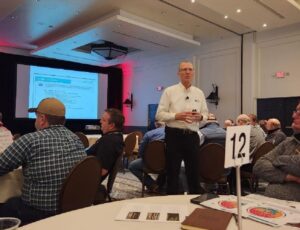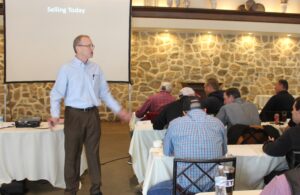Sales productivity and running your territory like a small business!
The question is, if it was your money or you owned the company, would you pay yourself to do what you are doing? As an Ag Sales Professional, operating out your home office and selling on commission, You Do Own the business. Your territory is your very own business. You have two customers: First, you have the customer you sell your products or services to: Farmers and Agribusinesses. Equally important as a customer is the company that hires you to sell for them. It may seem strange to think of your employer as your customer, but think about who writes you a check. Your employer!
The sooner you view your territory as your very own business, the sooner you become more efficient and effective in using your time. This doesn’t mean you can do anything you want with your business. As any owner will tell you, “I answer to my customers and to my board of directors.” In this case, your board of directors being your employer. This slight change in view of your territory will help you gain a clear focus on what you need to do and for who. Operating from a home office and covering a large geography, you struggle to figure out where to go and what to do. There are so many options: jump in the truck and get in the country, spend time in the office catching up on paperwork, make outbound phone calls, network with industry experts to become more technically proficient or attend an industry event. My answer to this is yes, you have to do it all. To free up some time, watch out for these time traps. One of the greatest ways to become more effective is to quit doing unproductive activities.
Time Traps that Slow Down the Ag Sales Professional:
-
The “I need to be driving around and seeing customers to feel like I’m doing my job” trap and its evil twin, “Office work is Paperwork”
Questions to Ask yourself: Is the time I am spending in front of my customer productive? Or am I spending too much of the call on trivial topics versus actually in the selling process?
“Face to face, belly to belly, that’s how you sell,” says your inner voice. “I feel like I’m not productive if I’m not out in front of a customer. “Sitting in my office, I almost feel guilty of not working,” your inner voice continues. Learn to quiet that voice because preparing for sales calls, doing your homework on a prospect and sharpening your skills is important to being successful when you do get back out in front of a customer. If you really need some help feeling better about being in the office, try to segment the office work into two categories. First are all those activities that directly affect your sales results: pre-call planning, background research on a prospect, putting together proposals. These are the things that will make you professional in your approach as opposed to just driving around making social sales calls. The second segment are those activities in the office that indirectly affect your customer: CRM, email, reports. Learn to prioritize but not ignore either type of activities. Many salespeople feel guilty or unproductive when they aren’t calling on customers. Recognize this feeling and realize that prep time for having more productive sales calls is important.
-
The “I need to run out and see a customer every time they call” trap. Often referred to as the “Superman Trap”
Questions to Ask yourself: Do I really need to go there? Now? Right Now?
You get the call from your customer. They ask for a contract or don’t understand something related to your product. So, you feel the sudden urge to jump in your truck and go see them. Feeling that you are the only one that can solve their problem and physically going there is the only way to do it right, you kill an hour or more of your time. Ask, can it wait? Can someone else in your organization help them? Do I actually have to go there? Even if you are in the area that day, it’s going to take introductory time, time to do whatever you went there for and then time to depart. Challenge yourself when you feel this need.
-
The “I need to be in my office doing service work for current customers versus prospecting” trap.
Questions to Ask yourself: Is my time in the office necessary? Is what I am doing increasing sales? How? Am I doing busy work to avoid calling on customers or prospecting? What would happen if I just quit doing this?
The opposite of the first trap is the feeling that you need to prepare to the nth degree and over provide your customers with service work. In the dairy feed world, this often turns into “doing rations” more often than you (and the cows) need you to. If you lack enough customers to go see, prospect. If you have a lot of customers and feel the need to do a lot of office or service work, re-evaluate how much you are doing for them.
-
The “I don’t want to seem unfriendly or too corporate so I’ll spend half the sales call talking about politics, sports, or other unrelated topics” trap.
Another time trap in sales is the efficiency and productivity while on a sales call. Ag sales really has a problem in this area. Why? We want to seem friendly and not appear to be too driven by “just getting the sale”. Often, salespeople will feel it’s too pushy or “Salesy” to just talk business on a farm call. While I think it’s important to connect and appear human to your customer, I also think you need to monitor how much time you are spending on these unproductive parts of your farm call. The first reason is that your customer might not enjoy nor prefer them as much as you think. Second, it’s cutting into your opportunity time to make another sales call. Pre-call planning and having an agenda is a great way to ensure you stay on task. Having a one-page or leave behind document is a great way to focus your customer’s attention on why you are there. Showing up with nothing in your hands, not taking notes and talking local sports can really look like a social visit to a customer. It doesn’t have to be anything super formal. I saw a rep hand write out the current prices and sketch out a few recommended ways to buy that day. She would leave this with the producer so he had something to look at while she was there and refer back to if he decided to buy later on. It was also a great way to ask a closing question. She would write up three or four options, number them and then ask which one seems like the best fit.
Summary: You have the ability to control your schedule. Some salespeople are better at managing their time than others. If you feel like you are one that doesn’t manage it well, put in a system to keep yourself on track. With technology, it’s very easy to use your phone with calendar reminders and CRM or Excel programs to keep track. If you are blessed with the ability to stay on task and be effective at time management in your territory, great. However, if you are not, you need to do two things. First, recognize that you are not organized and are spending time in unproductive ways. Second, use your available technology to build in systems to avoid the traps mentioned above.
Webinar
It’s Closing Time!
On average, you fail to ask for the sale 50% of the time!
Learn how to never forget to close at the end of every sales call you make!
Learn how to be successful on those Closes!
Pre-Recorded so you can watch it whenever you want!
Learn More – Click on the link below!
Make your next meeting memorable by bringing in a speaker who’s been there.
Contact me to find out how Greg@GregMartinelli.net (608) 751-6971
For more Ag Sales Training, Ag Sales Coaching and Leading Ag Sales Teams, go to http://www.GregMartinelli.net/




